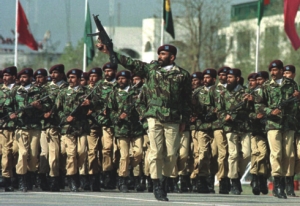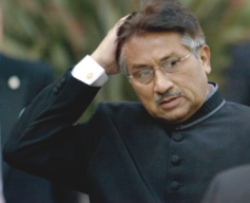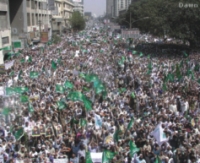|
International Letter to Musharraf
Barbara Plett
Pakistan's beleaguered president General Pervez Musharraf has suffered another blow, this time on the domestic front. He was already being criticised for his foreign policy - by the Americans for not doing enough to stop Taleban infiltration into Afghanistan across Pakistan's border, and by India for harbouring Islamist militants allegedly involved in the recent Mumbai bombings.
 General Pervez Musharraf's regime only contributed to the politicisation of the army |
Now a group of retired generals, sitting and former politicians and academics has urged him to end the military's role in politics by separating the two offices of state he holds.
"The office of president of Pakistan is also a political office, and combining the presidency with the office of army chief of staff politicises the latter post as well as the army," said a letter leaked to several local newspapers this week.
'Conciliation'
It called for a neutral caretaker government to ensure free and fair parliamentary elections due next year. And it urged "conciliation rather than confrontation", reflecting widespread concern that President Musharraf's continuing exclusion of Pakistan's main opposition parties may lead to violence.
"Despite the existence of elected legislatures and the prospects of the next elections, there is a deficit of trust and credibility that marks virtually all political relationships," said the letter.
"Increasing polarisation reflects the dangerous forces of exclusion and dominance." There's nothing new in the demands - they've been made repeatedly by commentators and opposition politicians. What's significant is who made them.
The group includes prominent figures in the Pakistani establishment, including retired intelligence chiefs and generals, some of whom are close to the president.
"One wonders why their conscience did not prick when they were in uniform," noted a laconic editorial in the Dawn newspaper. Another wit acidly observed that there are few so revolutionary as generals out of work.
 General Pervez Musharraf General Pervez Musharraf |
'Tired of Musharraf'
But signatories dismissed the cynicism. They said the letter was the result of months of discussions held by a working group on civil-military relations. When participants decided to draft the letter, it took six months to agree the text.
"The letter is significant in the sense that people from diverse backgrounds have come to a consensus," says Dr Hasan Askari Rizvi, a political analyst and one of the signatories. "It shows that a good number of generals have become tired of the Musharraf system."
A retired lieutenant general, Talat Masood, agrees. "We were motivated by a fear that the status quo is untenable and may be dangerous," he told the BBC. "We think that the more you involve the army, the more polarisation will increase - between the military
 More and more people want to see an end to the military rule |
regime and civil society, and between the provinces and the central government. "We had a strong view that this is not the way forward for the future of Pakistan." Having released the letter, what comes next?
"We're hoping that the debate can continue," said Mr Masood. "And rather than
confrontation, the government can find some flexibility to accommodate the opposition." Rising discontent
But confrontation is what seems to be looming. Ahead of next year's elections the two main opposition parties have agreed on a so-called charter of democracy committed to getting the military out of politics.
And Pakistan's powerful Islamist parties are talking about a rolling campaign of street protests to oust the president. There is also rising popular discontent over soaring prices of essential commodities and endless power cuts in what has been a particularly hot summer. That is what makes the letter important. It's another sign that the order set in place seven years ago by Gen Musharraf's coup may be coming to a close, or at the very least, that more and more people want it to.
This article was first published in bbcnews.com. Copyright
(R) thedailystar.net 2006 |
